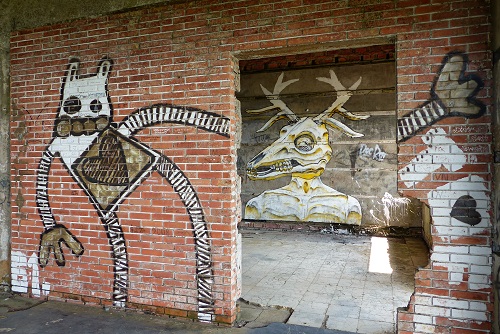Driving on the wrong side of the road, our minibus flew up the mountain, careering around tight bends and overtaking everything in sight. We were heading for Bokor Hill Station, an abandoned holiday resort that was once a summer retreat for the kings of Cambodia. Though we never did figure out why there was such a rush to get us there quickly.

View Of Bokor Mountain
We were at least grateful to be travelling on a new road. Toiling hard in the hot jungle, Cambodian convicts built the original road to Bokor Hill Station. Hundreds died in the process. Some fell foul of the venomous cobras that hung in the trees and the tigers that prowled through the undergrowth. Malaria claimed even more lives.
Right by the coast, the flat-topped Bokor Mountain was the perfect place for the French colonists to build a holiday resort. It provided an escape from the oppressive summer heat in Phnom Penh. The first buildings at Bokor Hill Station opened in the 1920s. However, after a turbulent few decades, Bokor Hill Station lay empty and derelict for many years.

Lok Yeay Mao
Arriving At Bokor Hill Station
Reaching the top of Bokor Mountain, we were confronted with a 29-metre high statue of Lok Yeay Mao, a Buddhist goddess mainly worshipped in the coastal areas of Cambodia. Sitting cross legged and straight backed with characteristically large ears, she gazed calmly down the mountainside to the sea beyond. Grinning plastic animals guarded the offering boxes at the foot of her pedestal.
King Sihanouk's Black Palace
Following an overgrown grassy track, we came to a derelict building. There was one intricately carved stone gable and a circular room with panoramic windows, which gave a hint of the former grandeur. However, the rest was just a shell with bare concrete walls and mouldy eaves.

The Black Palace
Built in 1936, this had once been a holiday cottage for King Sihanouk. It became known as the Black Palace, a reference to the black wood trimmings. Sadly, the wood was stolen by the Khmer Rouge when they took over Bokor Hill Station in the 1970s.
Of course there was a second house nearby, less grand but just as big, built for the King's concubines. They were well provided for and even had a swimming pool in the garden. Though despite the hot sunshine when we visited, the murky green water wasn't too inviting.

The Concubines' House
There was a lot of graffiti in the concubines' house, amongst which we found some impressive artwork. A skeletal deer's head decorated one of the rooms and a man's face watched us sombrely from one of the outer walls.
The Other Palace At Bokor Hill Station
King Sihanouk wasn't the only monarch to enjoy holidaying at Bokor Hill Station. We later saw his father, King Monivong's summer retreat. It was at the other side of the plateau, about as far away from the Black Palace as it could be. Whilst still derelict, this pair of bungalows were in better condition with green tiles covering the bathroom walls, less mould and less graffiti.
Read more about Phnom Penh and the king's main residence, the Grand Palace.

King Monivong's Palace
Temple Of The Five Boats
Our next stop was Wat Sampov Pram, the Temple of the Five Boats. According to legend, a royal couple were the first to colonise the area. They arrived on the mountaintop by boat and decided to stay, building a city to live in. There are no remains of this city but the boats, having turned to stone over time, are still there. We found the five rugged chunks of rock precariously perched on narrow keels, slowly disappearing into the encroaching bushes.

Wat Sampov Pram
The old Temple of the Five Boats is still there but it has now been superceded by a much larger temple, green and gold, covered in Buddhas with a bright red roof. Still under construction when we visited, the interior was already smothered in colourful scenes of Buddha's life, with strings of bunting criss-crossing the ceiling. Other new additions to the area included a huge golden Buddha presiding over a cliff-top terrace.

Inside The New Temple
Sokimex, a Cambodian investment group, are responsible for most of the recent development of Bokor Hill Station. They hope to revamp the area making it a popular holiday resort once more. They built the new road and, most notably, completely renovated the grand hotel, Le Bokor Palace. Easily the area's most iconic building, the hotel was until recently a derelict husk, much like the Black Palace today.

Le Bokor Palace
Death At Bokor Hill Station
During Bokor Hill Station's heyday, a casino provided entertainment for the holidaymakers. For some who lost everything at the tables, the sheer cliffs surrounding the plateau offered a suitable way out. These suicides were not the most notorious deaths at the resort however. When the Khmer Rouge took control, they killed the rich visitors in a bloody massacre. They were later ousted by the Vietnamese.
Towards the end of our trip, we stopped by a small Catholic church, which was caked in fluffy orange lichen but still surprisingly intact. Once the site of a famous battle between the Khmer Rouge and the Vietnamese, Sokimex soon hope to use it as a wedding venue as they continue to restore Bokor Hill Station to its former glory.

Inside The Catholic Church
How To Get To Bokor Hill Station
Bokor Hill Station is around 40 kms from central Kampot up a steep, winding mountain road. There are a couple of easy ways to get there.
1. Hire a motorbike in Kampot and make your own way there. You will be able to sightsee in your own time.
2. Join a tour. The main sights at Bokor Hill Station are usually combined into a half-day tour. This generally includes transport in a minibus and a mediocre lunch. Many tours also include a sunset river cruise in Kampot.

